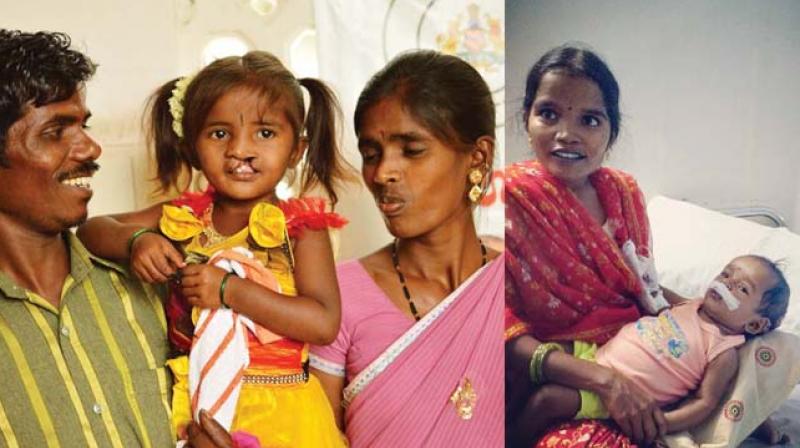Transforming smiles: One surgery at a time!
Cleft lip and cleft palate are thought to be caused by a combination of genes and other factors.

Bengaluru: There are different ways of bringing a lost smile back, one by creating a happy memory for those who can smile and the other is by bringing a smile for those who cannot smile. The latter lot consists of a large number of children with cleft lip, the second most common congenital defect and approximately 1 in 500 children in the country are born with this deformity. It is often a huge financial burden for families from low-income groups.
Cleft lip and cleft palate are thought to be caused by a combination of genes and other factors. It is estimated that over 1 million children in the country continue to suffer from the deformity. Over 35,000 cleft lip-affected children have been screened and 25,000 safe corrective surgeries performed in the country.
One such organisation, the Trinity Care Foundation (TCF), helps underprivileged children in need of surgery for treatable facial deformities like cleft lip, cleft palate, TMJ ankylosis, facial clefts, hemangioma and vascular malformations. “TCF, a 10-year plus public health organisation, focusing on enhancing the effectiveness of public health programmes by reaching out to socially and economically underprivileged sections both in rural and urban areas of the state," says Dr Tony Thomas, managing trustee, TCF.
Since 2013, the foundation has helped perform 473 free cleft surgeries on poor children. “326 poor children with cleft lip have benefited from our project. Some children required more than one surgery," he adds.
Dr Thomas says, “Cleft lip and cleft palate, especially in children go way beyond the realm of medical need. Apart from causing difficulties in breathing, eating and speaking, the greatest discomfort these children face is often cruel ridicule for their appearance and at times ostracisation from society. In a country like India where a large portion of rural population still believes in superstitions, people consider children with cleft lip to be bad luck and some even consider them cursed. The stigma attached to their deformity causes affected children, who are otherwise completely healthy, to lead incomplete, fractured lives. They are often forbidden from attending school, playing with other children, being seen at social gatherings and some are even barred from leaving their homes."
As timely help eludes rural families, the Foundation conducts craniofacial surgeries, school health programmes, outreach health programmes and computer literacy programmes in the state.
In November 2016, TCF and Rashtriya Bal Swasthya Karyakrama (RBSK) under the state health ministry signed an MoU to partner to reach out to children with cleft lip. Under the partnership, child health officials from six districts of Ramanagara, Bengaluru Rural, Kolar, Chikkaballapura, Tumakuru and Chitradurga will direct children born with facial deformities to TCF partner hospitals in Bengaluru. Dr N. Srinath, oral and faciomaxillary surgeon of TCF, is heading the Project. "We are focused on setting up a comprehensive treatment centre for children born with facial deformities," he reveals.
“The partnership looks at intensifying outreach so that more underprivileged children born with clefts can benefit from free surgeries and get a chance to lead a normal life. The surgeries will be provided by Trinity Care Foundation centre at Mallige Medical Centre, Bengaluru," he adds.
Dr Thomas says, “The optimal time to seek surgical treatment for your child to repair face defects is before one year of age since the bones are still soft and easy to work with. Surgical intervention may be necessary at a much earlier age depending upon the severity of craniofacial deformity. In some cases, surgery may have to be performed in stages to obtain optimum results. The craniofacial team assesses and monitors the child and then educates the family on how best to care for the child at home, and will also outline specific problems that require immediate medical attention.”
Funds for the surgeries depend mostly on donations, from like-minded individuals, Lions and Rotary Clubs and companies as part of their corporate social responsibility project, he reveals.

